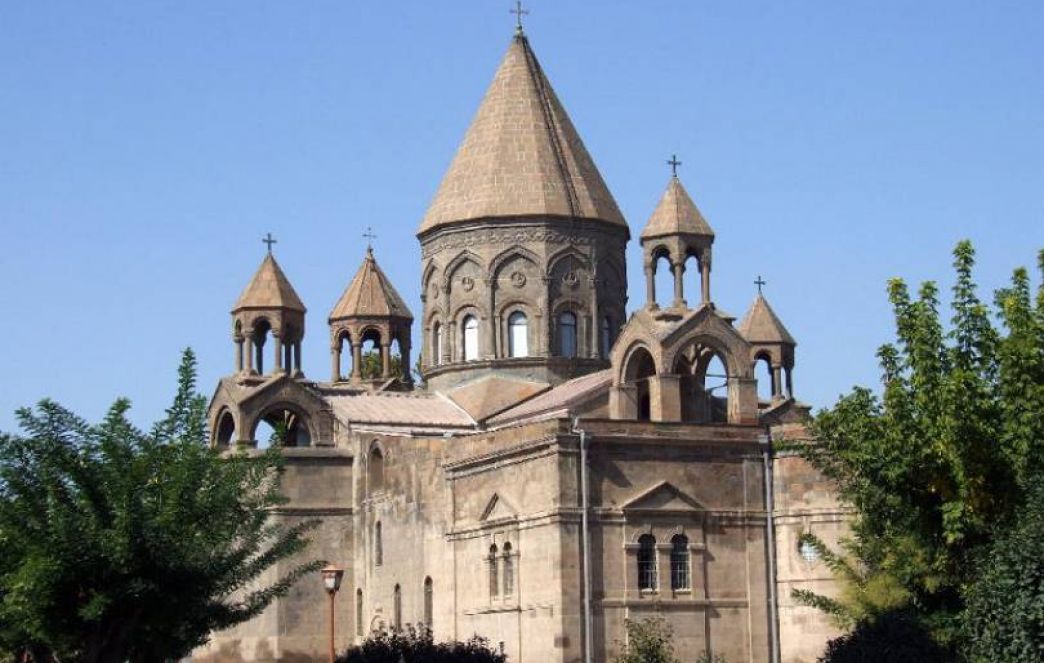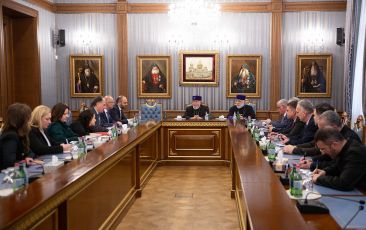Statement of the Working Group on the Issues Concerning the Relations Between the Republic of Armenia and the Armenian Apostolic Holy Church
 21.07.2020
21.07.2020
Below is the statement of the working subgroup of the Mother See of Holy Etchmiadzin on the issues concerning the relations between the Republic of Armenia and the Armenian Apostolic Holy Church, related to the draft of the State Public Educational Standards which has been under the public discussion since June 25 and submitted to the Ministry of Education, Science, Culture and Sport of RA on July 10.
Statement of the Working Group on the Issues Concerning the Relations Between the Republic of Armenia and the Armenian Apostolic Holy Church - Statement of the Working Group on the Issues Concerning the Relations Between the Republic of Armenia and the Armenian Apostolic Holy Church - the Subgroup Engaged in Educational Issues of the Mother See of Holy Etchmiadzin Related to the Project of the State Public Educational Standard
Considering the key historical role of the Armenian Church in the establishment and development of the Armenian school, as well as, its inevitable responsibility in the mission of teaching and educating generations in the spirit of national, spiritual and moral virtues, the Mother See of Holy Etchmiadzin always takes the initiative to maximally benefit the progress of the Armenian Educational system. In this regard, the Church welcomes each initiative of native authorities aimed at improving the public education and increasing its efficiency.
We are pleased to note, that as a result of an agreement between His Holiness Karekin II, the Armenian Patriarch and RA Prime Minister Mr. Nikol Pashinyan, on January 29, 2019, with the decision of RA Prime Minister, a working group was set up to control the Church-State relations and solve the existing issues. Within the framework of the latter, five bilateral thematic sub-groups were formed, one of which is the subgroup engaged in Educational issues. We are regret to note, that up to date, it has been impossible to hold meetings and discussions because of the lack of subgroup working on Educational issues by the relevant state bodies.
Few days ago, the State Authorized body put the project of the State Public Educational Standard (hereinafter the Project) into circulation, in the improvement process of which, in contrast to the achieved agreements, the Church was not invited to participate. Thus, taking into account this evidence, within the framework of its statement, the Subcommittee of the Mother See of Holy Etchmiadzin engaged in the Educational issues (hereinafter Subgroup of Educational Issues), states:
A. The Section of the General Provisions of the Project claims that the aim of the latter is to define “the expected quality requirements of the graduate of the secondary education program: abilities (competencies), the expected outcomes of the graduates of the Elementary, Basic and Secondary Education programs, the minimum and maximum volumes of the students’ educational workload, the system principles according to educational degrees and students”.
Basically, the Project is developed to set the benchmark/criterion of spiritual, mental abilities and behavioral manifestations of the school graduates, which are considered as priorities and needs for RA citizen. Thus, in the further context, it is not tangible how the quality requirements defined for the secondary education graduate correspond to the challenges our country faces, in particular,to our spiritual and physical security, to the existing issues in the fields of the protection of national values and identity.
Emphasizing the importance of the training program of the generation been educated with the knowledge of natural science, technological, sociological, economic, technical and other areas, thus, the Subgroup of Educational Issues claims, that according to the RA Law of Public Education, one of the key objectives of the education is “ensuring the sustainable development and safety of the individual and society, and security of the Armenian Identity, which is the basis of RA State Policy in the field of Public education (n. 4).
It is also remarkable, that according to the part 3 of article 4 of the Law on Education, “The educational system of the Republic of Armenia is aimed at strengthening the spiritual and mental potential of the Armenian people, maintenance and development of the national and universal values. The Armenian Church also contributes to this work”.
B. It is concerning, that the Project contains definitions which provide opportunity to reduce the class hours of Armenological studies, which, throughout the time, will inevitably lead to the weakening of the consciousness of national identity. The conviction of the subgroup engaged in educational issues is that the Armenology should be recognized as a priority direction of Public education.
It is strange, that the defined results almost lack of the concepts of “Nation”, “Fatherland”, “Armenian”, and the requirements of recognizing and respecting those.
In the Project, the language, including the Armenian language, is only considered to be as “a universal tool for learning and participation in public life, while, first of all, the Armenian language has the function of recognizing and revealing the national identity.
The formulation of “striving for self-awareness through self-reflection and self-organization” is also confusing, which essentially ignores the Christian belief of achieving self-recognition through spiritual knowledge and experience.
C. The Project lacks of any reference on teaching ethics. The word "ethics" is used with limited meaning and usage simply to emphasize the need of the existence and maintenance of the behavior in different areas (e.g. “maintenance of online communication ethics”). Moreover, the Armenian Church, that originally has formed the spiritual-moral value system of our people on the basis of the Christian doctrine and has become the direct supporter of its preservation and development, is mentioned in the project in a poorly way: only once. However, such approach is not in tune with the constitutional status of the Armenian Apostolic Holy Church given by the RA Constitution, according to which: “The Republic of Armenia recognizes the mission of the Armenian Apostolic Holy Church as an exclusive mission of a National Church in the spiritual life of the Armenian people, as well as, in the development of their national culture and maintenance of national identity” (RA Constitution, n. 18).The Subgroup on educational issues states, that education is a way of conceiving the spiritual-moral virtues, thus, achieving self-improvement and self-recognition. Knowledge without morality directly becomes a threat to both the individual and society. A lot of such kind of facts can be found in the world’s history throughout the last century.
D. It is absolutely incomprehensible, that even the word “Christianity” is absent in the document claiming to be the State Standard of Public Education of a State, which was the first in the world to adopt the Christianity as a State religion, and the children will be taught knowledge about “the Armenian religion”. There is an impression, that the Project does not refer to the nation which has two thousand years of history and identity with Christian mission of the National Church, but a newly formed union…
E.The approach to removethe “History of the Armenian Church”subject,forming national image and value system, as a separate mandatory state component, and dissolve it in other patriotic subjects, is very concerning. The Project should not contradict to the Law on “the relations between the Republic of Armenia and the Armenian Apostolic Holy Church”, according to the 8th article of which, the “History of the Armenian Church” is a mandatory subject to be taught separately, and the Armenian Apostolic Holy Church has the right “…to participate in the development of the curriculum and books of the “History of the Armenian Church” subject in the state educational institutions, as well as, in defining the qualification requirements for the teachers who teach it, and nominate those teachers to schools”( RA Constitution, Part 2 of Article 5, Part 2 of Article 9 of the Law on “Normative Legal Acts”).
It is a proven fact, that this subject been introduced in public schools 15 years ago, already has its established traditions and permanent place in the subject list.
F. It is stated in the propositions of the project, that the experience of “California, Massachusetts, Minnesota, New Jersey States of US, Singapore, Finland, Estonia and other countries” related to the Public Educational standards had been studied during the development of the Project. Highly appreciating the research zeal of the Project members, it is impossible not to mention, that it was also necessary to study the experience of the countries, that are more compatible with our country due to their ethnic, religious, cultural and geopolitical situation.
The conviction of the Subgroup on educational issues is that it is impossible to develop the State Public Educational Standard without comprehensive and deep study of the historical experience of organizing education in the life of our people and heritage.
G. It is also a serious omission, that the Project does not refer to the Diaspora and its educational needs, in the case, that the Republic of Armenia, as a Fatherland of All Armenians, cannot be inactive in the implementation of the most important function of preserving the Armenian identity in the Diaspora, which is the requirement of the Part 2 of Article 19 of RA Constitution: “The Republic of Armenia contributes to the development of the Armenian language, Armenian historical and cultural life according to the International Law”.
Considering the conceptual gaps in the Project, the Subgroup on Educational issues urges to refrain from rushing and making hasty decisions, thoroughly review the Project, involving a wider circle of the professional community in the process of developing the latter, taking into account the observations and positions of national, public institutions and structures, as well as, the society.




